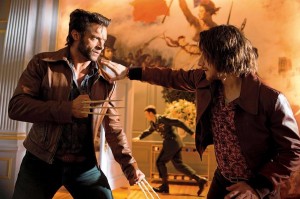Singer scandal shouldn’t affect X-Men box office
When it was first announced that director Bryan Singer would be returning to the X-Men franchise to helm an adaptation of Chris Claremont’s classic “Days of Future Past” storyline, fans began salivating over the prospect of a film with the adamantium-bonded gonads to bridge the decades-spanning continuity divide between Singer’s first two films — let’s just ignore Brett Ratner’s much-maligned trilogy capper, The Last Stand — and Matthew Vaughn’s stylish, James Bond-inspired prequel, X-Men: First Class. With less than a month to go before its May 23 release date, X-Men: Days of Future Past is reportedly testing through the roof with preview audiences and seems on track to become one of the biggest blockbusters of the summer.

Claws and effect · Wolverine, once again played by Academy Award-nominee Hugh Jackman, is sent back in time to prevent a cataclysmic event that will spell doom for mutants and humans alike in Bryan Singer’s X-Men: Days of Future Past. The film will be in theaters May 23. – Photo courtesy of 20th Century Fox
Last week, however, the largely positive buzz surrounding the film took a backseat to a suspiciously timed lawsuit accusing Singer of sexual misconduct with a teenage boy in the late ’90s. Thirty-one-year-old Michael Egan III, an aspiring actor and model who was 15 years old when the alleged mistreatment began, has accused Singer, who is openly gay, and three other high-ranking industry executives of plying him with drugs and taking advantage of him repeatedly during a series of sordid pool parties in Encino, Calif. and Hawaii, some of them allegedly hosted by infamous dot-com burnout and convicted child molester Marc Collins-Rector.
Singer’s attorney Marty Singer (no relation), meanwhile, has categorically denied all of Egan’s claims, calling them “absurd” and “defamatory,” and the filmmaker, who insists he was shooting the first X-Men in Toronto during the time the abuse was alleged to have taken place, purportedly plans to countersue his accuser for “malicious prosecution.”
Even though the truth of Egan’s accusations will likely never be fully known, the scandal has nonetheless reignited a very old debate, one that flared up again earlier this year with the ugly, pointless exhumation of the Woody Allen-Dylan Farrow molestation case.
The ability to separate art from the artist is a challenge all of us struggle with to some degree. Often, it depends on the severity and recency of an artist’s supposed offense. The spectrum runs from gifted but well-documented jerks, such as Frank Sinatra, to lunatic geniuses such as the 16th century Italian painter Caravaggio, who is rumored to have castrated and murdered a romantic rival during a duel over the outcome of a tennis match.
Roman Polanski, a great filmmaker who has all but admitted to the rape of a 13-year-old girl, seems to be the go-to example whenever this argument is brought up. Can you watch masterpieces such as Chinatown and Rosemary’s Baby without being reminded of his crime? Can you chuckle at the slapstick antics of O.J. Simpson as Leslie Nielsen’s blundering partner Nordberg in the Naked Gun series without feeling guilty afterward? Can you admire the acting skills and underrated directorial prowess of Mel Gibson — seriously, go queue up Apocalypto on Netflix right now — without remembering all those vicious drunken tirades?
The answers to these questions are intensely personal, and to be perfectly honest, they should probably stay that way. After all, none of us have all the facts in these cases, and it would be a mistake to pretend otherwise. Social media, meanwhile, has proven itself a poor platform for discussing contentious, multifaceted issues, the kind that can’t be expressed in sound bites or 140 characters or less. The court of public opinion — at least the Internet and cable news version — has been reduced to the level of a gibbering, bloodthirsty peanut gallery, where opinions and rumors masquerade as hard evidence, willful ignorance insists upon itself and “guilty until proven innocent” seems to be the prevailing edict.
Despite all the attention the Singer scandal is currently receiving, it remains unlikely that this controversy will have any measurable effect on Days of Future Past’s box office haul. If the same allegations had surfaced regarding one of the film’s stars, 20th Century Fox would have had cause for concern. Luckily for them, however, the average moviegoer isn’t familiar with directors who aren’t named Christopher Nolan, Quentin Tarantino or Steven Spielberg. Just to be safe, though, the embattled filmmaker skipped last weekend’s WonderCon, sending producer and franchise scribe Simon Kinberg in his place to tease fans with more of the Sentinel-heavy opening sequence that debuted during the MTV Movie Awards.
Days of Future Past was envisioned as a years-in-the-making cinematic event on par with The Avengers, and that’s exactly what it’s shaping up to be. The film, which involves Kitty Pryde (Ellen Page) sending Wolverine (Hugh Jackman) back in time to unite the younger Professor X and Magneto against a common enemy, boasts an exhaustively impressive cast of new stars and old favorites, including Patrick Stewart and James McAvoy as Professor X, Ian McKellen and Michael Fassbender as Magneto, Jennifer Lawrence as Mystique, Peter Dinklage as the mutant-loathing industrialist Bolivar Trask, Anna Paquin as Rogue, Nicholas Hoult as Beast and American Horror Story’s Evan Peters as Quicksilver, the same character Aaron Taylor-Johnson is portraying in next year’s The Avengers: Age of Ultron.
So in closing, here’s a word of advice to all concerned X-fans: Rather than dwelling on the darkness that might or might not lurk in one man’s past, you should be looking toward the future of the X-Men franchise, because it’s never been brighter. Look closely enough, in fact, and you can already see 2016’s X-Men: Apocalypse cresting the horizon.
Landon McDonald is a graduate student studying public relations. His column, “The Reel Deal,” runs Thursdays.

